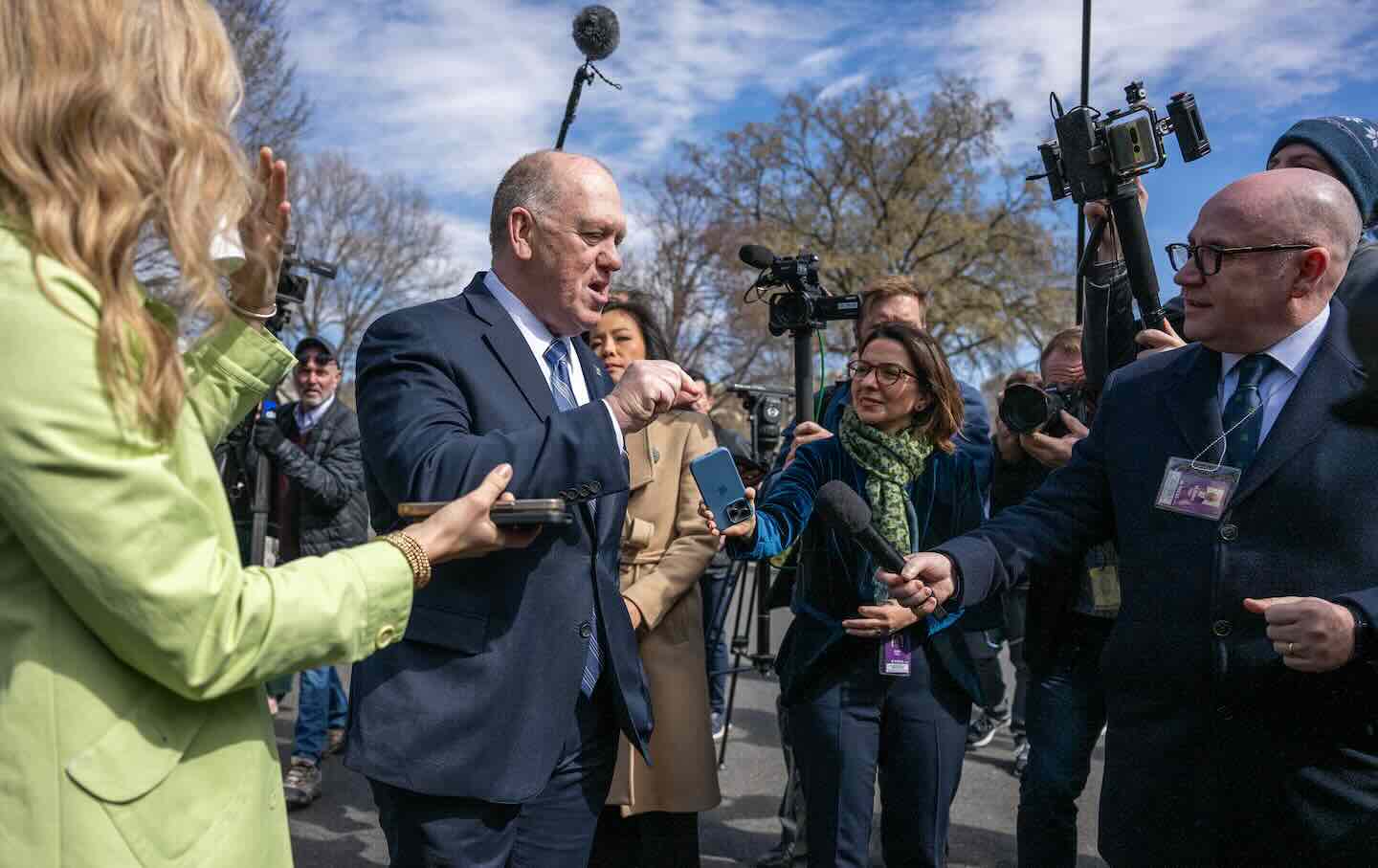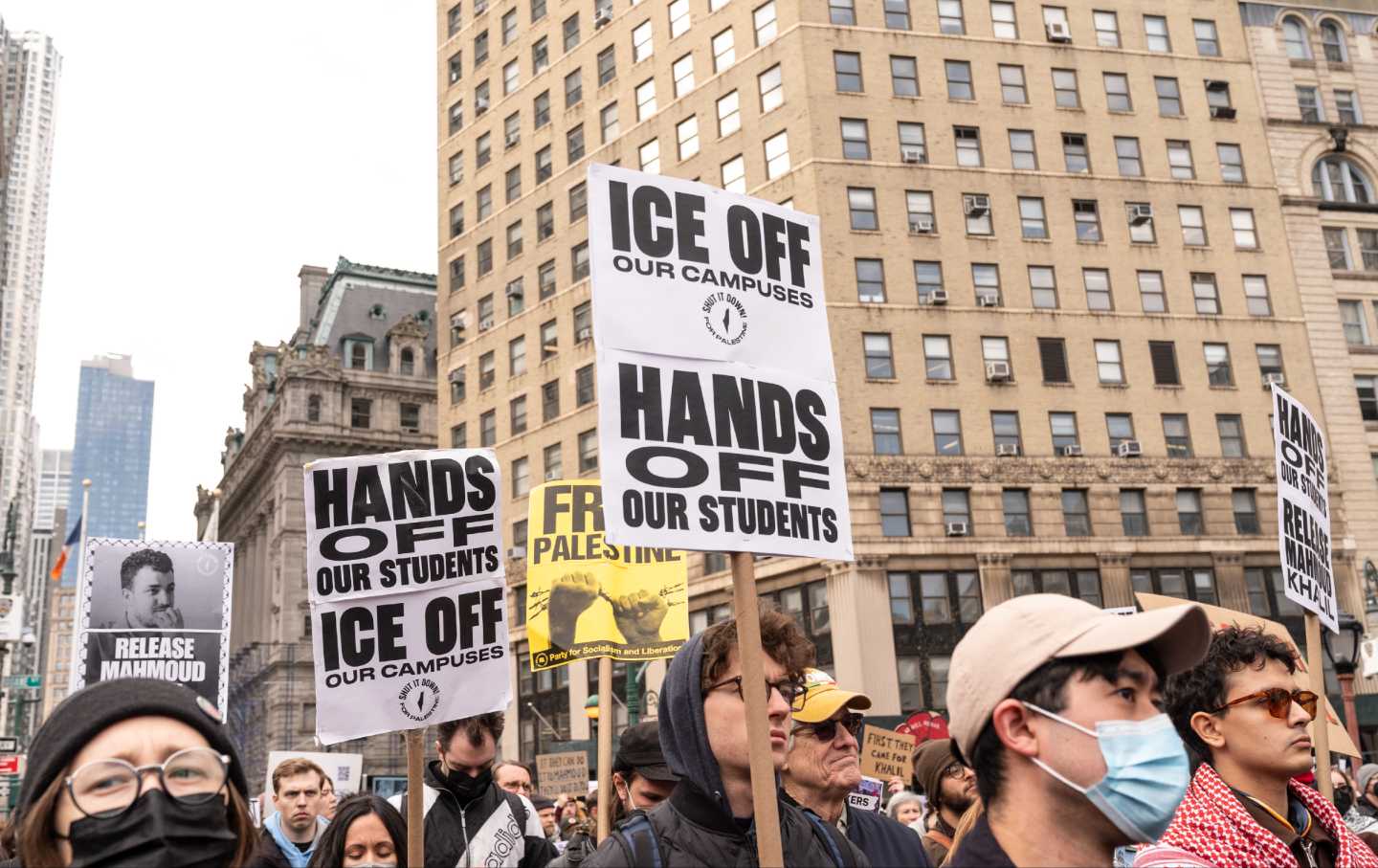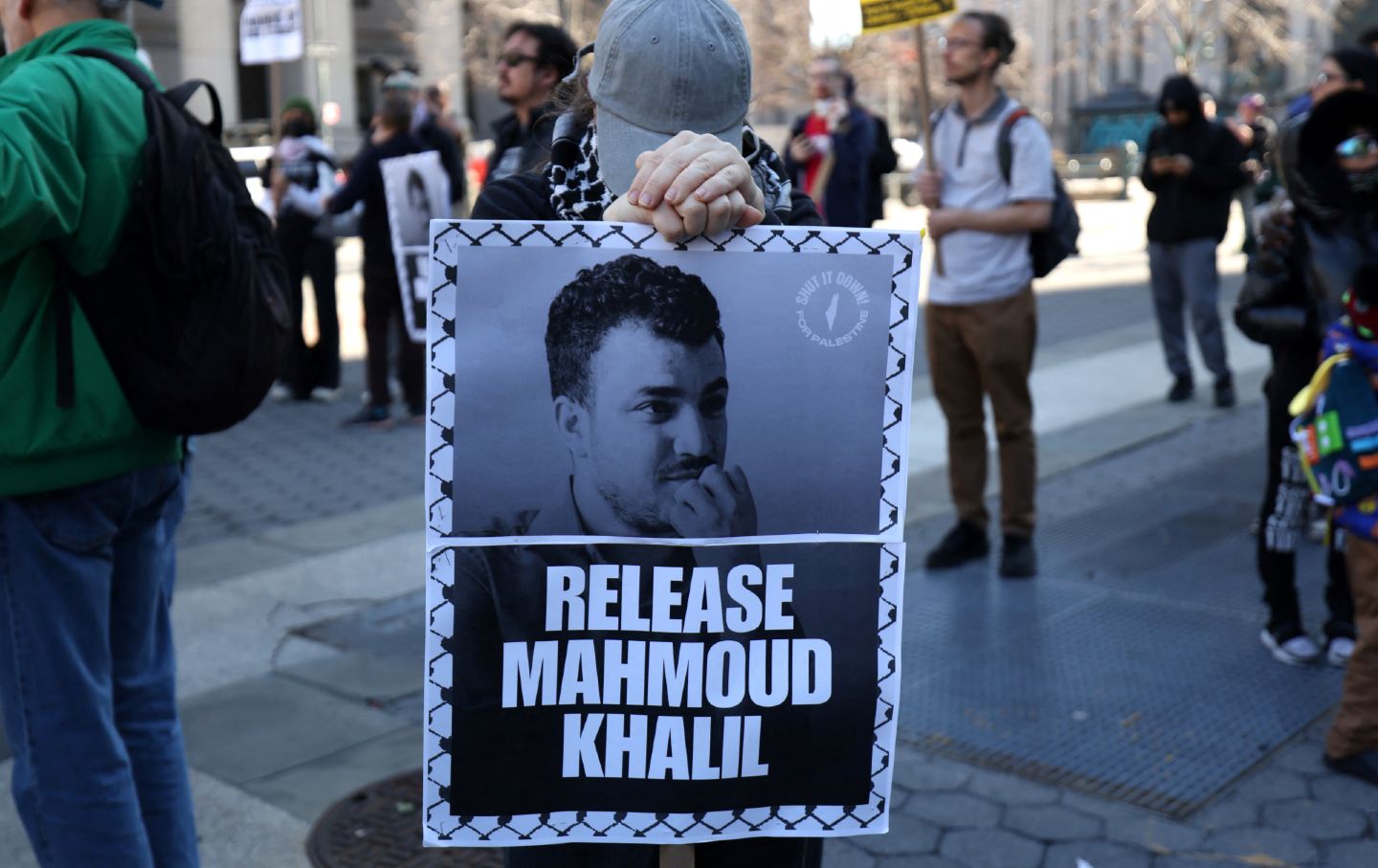Trump Wants to Be America’s Landlord
Project 2025 calls on Trump to run the country the way he did his businesses: as a crooked real estate mogul.

This article is part of “Project 2025: The Plot Against America,” a Nation special issue devoted to unpacking the right’s vast and chilling program for a second Trump term.
Project 2025’s blueprint for housing policy in a potential second Trump presidency is predictably awful. It manages to combine the worst traditional GOP obsessions around deregulation and rolling back what remains of the American welfare state with the most destructive Trumpian impulses to use the power of the state to crush the professional civil service and penalize immigrants. Add into the mix an effort to privatize the most valuable parcels of public housing stock and the obligatory swipe at the diversity, equity, and inclusion programs championed by the Obama and Biden administrations within federal housing agencies, and you have Trump’s grab bag of grift and cruelty in a nutshell.
It is a collection of bad policies tailor-made to appeal to the instincts of Donald Trump, who inherited his family fortune from his father, Fred, a harsh and frequently racist New York City landlord. The younger Trump’s own real estate ventures over the past half-century have frequently involved cutting corners, making life miserable for rent-controlled tenants in an effort to get them to pack up and leave his properties, and failing to pay contractors in a timely manner. Project 2025 would effectively give Trump a green light to keep it up, suggesting that he use his powers as president to push through a set of regulatory changes that would take a wrecking ball to federal housing policy.
Project 2025
Despite the hundreds of thousands of homeless Americans and the years- or even decades-long waiting lists that families remain on for public housing or Section 8 vouchers, the Project 2025 Mandate refers to a nearly century-long “mission creep” by federal housing agencies from the New Deal on. It places blame for that supposedly overgenerous housing impulse on “an empowered and unelected bureaucracy that is insulated by civil service protections.” Its solution is to urge an incoming Trump administration to remove those civil service protections and replace the top tier of federal housing officials with “motivated and aligned” political appointees, so as to be better able to “end progressive policies that have been put in place at the department.” Translation: An already imperfect, frequently unsympathetic, and underfunded system for providing housing assistance will be eviscerated by a new leadership of hard-right political cadres committed to reducing federal housing guarantees back to their almost nonexistent, pre–New Deal level.
The document is clear about its goals, chief among them a renewed effort to exclude immigrants—both documented and undocumented—and their US-born children (i.e., US citizens) from any access to the social safety net; to banish all use of federal agencies to boost efforts to tackle climate change; and, through repeal of the Affirmatively Furthering Fair Housing regulation that Biden strengthened in his first week as president and proposed expanding again last year, to reverse all efforts at fair housing policies that protect access to federally funded or subsidized housing for women and racial and LGBTQ minorities in particular. Under Biden’s proposed rule, municipal public housing agencies would be required to start submitting equity plans to the Department of Housing and Urban Development (HUD) every five years; under Trump, such reporting would immediately be scrapped.
If these policy recommendations are implemented, the country’s already grossly unequal access to affordable housing would be made even worse; the homelessness crisis in cities like Los Angeles, home to large numbers of mixed-status families, would skyrocket; and equity would no longer be a goal of federal housing policy.
While an array of minorities stand to lose out from this regulatory shift, no group would lose more in the immediate aftermath of a Trump victory than immigrants and their families, who bore the brunt of Trump’s xenophobia and racism in his previous White House sojourn and would again be in his crosshairs from day one of a second presidency. From 2016 to 2020, the Trump administration attempted to end the practice of “pro-rated” housing benefits, which historically allowed mixed-status families to live in public housing, but with benefits extended only to those in the household with citizenship, while noncitizens were charged their percentage of the rent. Instead, it sought to use the Department of Homeland Security’s Systematic Alien Verification for Entitlements (SAVE) system to exclude mixed-status households from all public housing and Section 8 vouchers. Eighty-five percent of these families were Latino, according to estimates from the Center on Budget and Policy Priorities; 56 percent of these household members were female (some of whom were fleeing from domestic violence); and 53 percent were children.
Had it been implemented, this noxious policy would have resulted in huge numbers of US-citizen and legal-resident children (55,000, according to HUD’s own analysis) born to noncitizen parents being excluded from such benefits. Trump’s HUD secretary, Ben Carson, portrayed it as a commonsense measure, saying, “You take care of your own first.” In reality, it was a recipe for wholesale immiseration. The Los Angeles Times estimated that more than 3,000 mixed-status households in LA County, including roughly 11,000 people in the city of Los Angeles alone, would lose their housing benefits if the change were implemented and that, in a tight and overpriced housing market, many of these men, women, and children would end up on the streets.
Now, a resurrection of this policy—which Trump’s own HUD team described as deliberately “ruthless” in 2019—is at the center of Project 2025’s housing proposals, some 500 pages into its 900-page blueprint for the next Trump presidency. Under Trump, the document declares, HUD would move to “prohibit noncitizens, including all mixed-status families, from living in all federally assisted housing.” In a metropolitan area such as Los Angeles, with a high immigrant population and a catastrophic homelessness crisis—upwards of 75,000 people in LA County lack housing, according to HUD’s most recent Point-in-Time estimates—resurrecting this particularly vicious policy would have an immediate, and calamitous, impact.
The document’s ambitions, however, go far beyond simply institutionalizing xenophobia. Project 2025 suggests putting in place strict time limits for public housing residents, much like the Temporary Assistance for Needy Families welfare “reforms” in the mid-1990s did regarding cash assistance for poor families, and it also hints at establishing work requirements for the recipients. It seeks to end “housing first” policies aimed at getting people with substance abuse and serious mental health problems off the streets and into assisted-living situations regardless of whether they’re still using drugs or have untreated mental illness. And it takes a policy championed by Margaret Thatcher’s Conservative government in the UK in the 1980s—the selling-off of existing public housing stock—and updates it for the US in the 2020s, pushing for “maximal flexibility to direct PHA [Public Housing Agency] land sales that involve the existing stock of public housing units. Congress must consider the future of the public housing model…where land can be sold by PHAs and put to greater economic use.” In other words, housing the poor at below-market rates isn’t an efficient use of land capital—whereas selling off those homes could result in a real estate bonanza and a payday for today’s investor class.
Under the guise of protecting local autonomy, Project 2025’s Mandate urges an incoming Trump administration to “oppose any efforts to weaken single-family zoning.” This flies in the face of the advice offered by most urban housing experts, who argue that the country’s housing crisis can’t be solved without building more high-density affordable-housing apartment complexes and mixed-use neighborhoods. If the federal government puts its muscle behind NIMBYist movements and their efforts to protect, at all costs, low-density suburban-sprawl development models, these affordable-housing efforts will be eviscerated.
The goal of using federal financial instruments to encourage low-income residents to find ways to buy homes also takes a hit in Mandate. The document’s authors urge the Federal Housing Administration to push for shorter mortgage terms for lower-income first-time buyers by making it more costly for them to get FHA-backed mortgage insurance on 30-year mortgages—and this despite the fact that, according to Freddie Mac, 90 percent of American homeowners opt for a fixed-rate 30-year mortgage, and the majority of Americans could not afford the monthly payments that would be needed on a 15- or 20-year mortgage. In other words, what’s good enough—and even considered necessary—for most middle-class Americans would likely be discouraged for lower-income people seeking a foothold in the overheated housing market.
To be clear, these aren’t radical new policies. Rather, using a nefarious language of “choice” and “local autonomy,” they are radical old policies, microwaved leftovers of the worst of the Reagan-and-Thatcher-era assaults on the housing safety net on both sides of the Atlantic, adorned with a Fred Trump–like disdain for any efforts to discourage bias in the housing sector or to hold landlords and local housing agencies to account when they discriminate against tenants and would-be tenants on the grounds of race, gender, sexuality, or any other prejudice. This is federal housing policy tailored to meet the needs not of housing-insecure residents, but of the most malicious landlords and real estate interests. It is a package of proposals intended to scare off poor, minority, and especially immigrant residents from reliable access to the housing safety net, and to make it easier for profiteers to make a quick buck off of the poor and the already denuded public housing stock that, for so many, serves as a fragile protection against homelessness and destitution.
Support independent journalism that exposes oligarchs and profiteers
Donald Trump’s cruel and chaotic second term is just getting started. In his first month back in office, Trump and his lackey Elon Musk (or is it the other way around?) have proven that nothing is safe from sacrifice at the altar of unchecked power and riches.
Only robust independent journalism can cut through the noise and offer clear-eyed reporting and analysis based on principle and conscience. That’s what The Nation has done for 160 years and that’s what we’re doing now.
Our independent journalism doesn’t allow injustice to go unnoticed or unchallenged—nor will we abandon hope for a better world. Our writers, editors, and fact-checkers are working relentlessly to keep you informed and empowered when so much of the media fails to do so out of credulity, fear, or fealty.
The Nation has seen unprecedented times before. We draw strength and guidance from our history of principled progressive journalism in times of crisis, and we are committed to continuing this legacy today.
We’re aiming to raise $25,000 during our Spring Fundraising Campaign to ensure that we have the resources to expose the oligarchs and profiteers attempting to loot our republic. Stand for bold independent journalism and donate to support The Nation today.
Onward,
Katrina vanden Heuvel
Editorial Director and Publisher, The Nation
More from The Nation

Hey, Irish Catholic Trump Supporters: Your People Were the Original Alien Enemies Hey, Irish Catholic Trump Supporters: Your People Were the Original Alien Enemies
Irish Catholics who back Trump would do well to remember the origins of the Alien Enemies Act.

“Essentially Cages”: ICE Is Using Courthouse Cells for Lengthy Detentions “Essentially Cages”: ICE Is Using Courthouse Cells for Lengthy Detentions
Detainees report not having access to private toilets, showers, hygiene products, and lifesaving HIV and diabetes medication.

“I’m Terrified”: Trans-Feminine Athletes in Their Own Words “I’m Terrified”: Trans-Feminine Athletes in Their Own Words
In part two of a series, trans women athletes describe what it’s like to compete in the Trump era.

Columbia Is Betraying Its Students. We Must Change Course. Columbia Is Betraying Its Students. We Must Change Course.
The administration is choosing complicity over courage in the case of Mahmoud Khalil. It’s time for the faculty to demand a new path.

The Trans Cult Who Believes AI Will Either Save Us—or Kill Us All The Trans Cult Who Believes AI Will Either Save Us—or Kill Us All
What the Zizians, a trans vegan cult allegedly behind multiple murders, can teach us about radicalization and our tech-addled politics.

We Are Asking the Wrong Questions About Mahmoud Khalil’s Arrest We Are Asking the Wrong Questions About Mahmoud Khalil’s Arrest
The only relevant question is not “How can the government do this?” It is “How can we who oppose this fascist regime stop it?”


